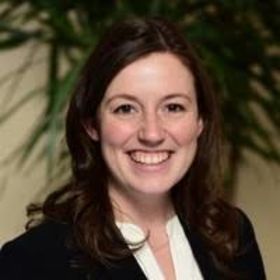Megan Murday
MBA 2021
MBA 2021
“We need people who see climate change as a business problem, not a ‘save the world’ problem.”
“I felt drawn to impact work early on,” says Megan Murday (MBA 2021). Growing up in a deindustrialized area south of Chicago, Murday thought she would begin her career working in the government; she pursued a degree in international politics at Georgetown and interned in the State Department and on Capitol Hill. “Government provides leadership—as well as the guardrails—to confront societal issues,” she says. “But I saw that the public sector alone didn’t have the speed or scale to address large, systemic challenges like climate change or socioeconomic equality.”
Murday pivoted to the private sector, working as a management consultant for several years before coming to HBS. “I had taken one finance class as an undergrad and that was it; the first-year curriculum was really foundational for me, particularly The Entrepreneurial Manager,” she says. “I was already building my startup at that point, and Professors Stig Leschly and Christina Wallace have both been so supportive. Professor Leschly demystified the persona of a founder-savant coding in their basement by saying, ‘Anyone can do this. You can do this. It’s one problem at a time.’ That demystification is important because those tropes keep a lot of people out of entrepreneurship.”
In the fall of her first year at HBS, Murday cofounded the HBS Sustainability Club with classmates Roxanne Tully and Zack Jacobson. “There are great opportunities in the Energy & Environment Club and the Food, Agriculture & Water Club,” says Murday, “but there was no central hub for students interested in addressing climate change through the private sector.” The club hosted its first virtual conference in fall 2020, convening speakers including the chief sustainability officers of Morgan Stanley, Nike, Walmart, and Pepsi. “As a club, we’ve been focused on equipping our classmates to bring an understanding of sustainability and climate risk to their private sector roles right out of the gate, instead of waiting until they get to the C-suite. We need people out there who see this as a business problem, not a ‘save the world’ problem.” Carbon tax legislation could be years away, she adds: “This is a ‘now’ concern; we can’t use individual responsibility as a cop-out for corporate action.”
Entrepreneurship also has a role to play, Murday says. Metric, the startup she launched as a student, was a finalist in the HBS New Venture Competition. With growing demand for ESG transparency, Metric provides a Turbo-Tax–like software solution for private market investors to measure, compare, and manage the ESG performance of their portfolio companies. “I believe we’ll continue to see the interconnection between profitability, sustainability, and equity,” says Murday, “but companies can’t get there unless they have an ESG dataset that is accurate and actionable. I’m excited about this space.”
She’s also excited that Metric will be based in Chicago. “I wrote my HBS application essay on the need for entrepreneurship and tech-led growth in the Midwest, and why it’s economically and politically destabilizing for capital, talent, and jobs to accumulate on either coast,” says Murday, who continues to hold a strong interest in the public sector—and has not ruled out serving in state government. “The private sector can move quickly and has the resources to put up against issues,” she says, “but we won’t come up with long-term solutions to climate change and socioeconomic inequality without strong public sector leadership.”

